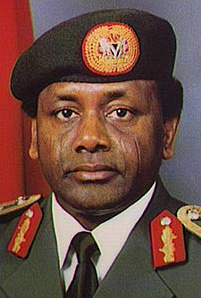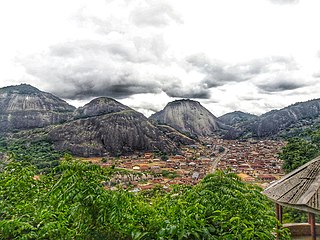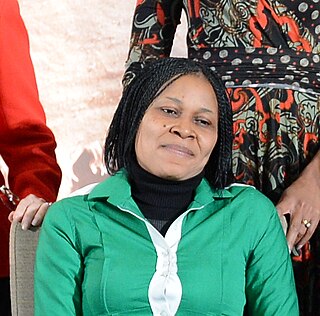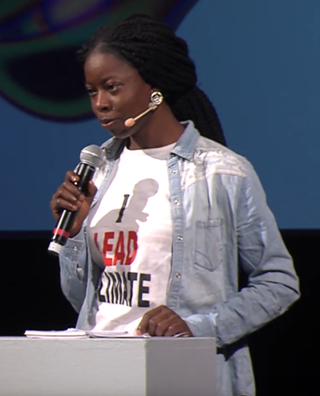Related Research Articles

Kenule Beeson "Ken" Saro-Wiwa was a Nigerian writer, teacher, television producer, and environmental activist. Saro-Wiwa was a member of the Ogoni people, an ethnic minority in Nigeria whose homeland, Ogoniland, in the Niger Delta, has been targeted for crude oil extraction since the 1950s and has suffered extreme environmental damage from decades of indiscriminate petroleum waste dumping.

Sani Abacha ; was a Nigerian military dictator and statesman who ruled Nigeria as the military head of state from 1993 following a palace coup d'état until his sudden death in 1998.

Ondo State is a state in southwestern Nigeria. It was created on 3 February 1976 from the former Western State. Ondo borders Ekiti State to the north, Kogi State to the northeast for 45 km, Edo State to the east, Delta State to the southeast for 36 km, Ogun State to the southwest for 179 km, Osun State to the northwest for 77 km, and the Atlantic Ocean to the south. The state's capital is Akure, the former capital of the ancient Akure Kingdom. The State includes mangrove-swamp forest near the Bights of Benin.
The Movement for the Survival of the Ogoni People (MOSOP), is a social movement organization representing the indigenous Ogoni people of Rivers State, Nigeria. The Ogoni contend that Shell Petroleum Development Company (SPDC), along with other petroleum multinationals and the Nigerian government, have destroyed their environment, polluted their rivers, and provided no benefits in return for enormous oil revenues extracted from their lands.
Dr. Bekolari Ransome-Kuti was a Nigerian physician known for his work as a human rights activist.
Olisa Agbakoba is a Nigerian human rights activist, maritime lawyer and former President of Nigerian Bar Association.
The National Democratic Coalition (NADECO) was formed on 15 May 1994 by a broad coalition of Nigerian democrats, who called on the military government of Sani Abacha to step down in favour of the winner of the 12 June 1993 election, M. K. O. Abiola. The members mostly came from several pro-democracy and activist groups located especially in Lagos, the southwest region of the country. They quickly became the symbol of mass resistance against military rule. On 11 June 1994, using the groundwork laid by NADECO, Abiola declared himself president and went into hiding. He reemerged and was promptly arrested on 23 June.
Lt. Colonel Dauda Musa Komo was Administrator of Rivers State, Nigeria from December 1993 to August 1996 during the military regime of General Sani Abacha. He took office at a time of escalating violence between the Ogoni and Okrika people over crowded waterfront land, combined with Ogoni protest against Shell Oil activities and the environmental destruction of Ogoni land. He reacted aggressively, sending troops to break up demonstrations and arresting leaders of the Ogoni's MOSOP movement.

The majority of the countries of the Commonwealth of Nations, formerly known as the British Commonwealth, still criminalise sexual acts between consenting adults of the same sex and other forms of sexual orientation, gender identity and expression. Homosexual activity remains a criminal offence in 29 of the 56 sovereign states of the Commonwealth; and legal in only 26.

Sahara Reporters is a news agency based in New York City that focuses on promoting citizen journalism by encouraging everyday people to report stories about corruption, human rights abuses and other political misconduct in Africa, with special focus on Nigeria. Sahara Reporters specializes in exposing corruption and government malfeasance.
This is a list of lists of activists.

Irreligion in Africa, encompassing also atheism in Africa as well as agnosticism, secular humanism and general secularism, has been estimated at over tens of millions in various polls. While the predominant religions in Africa are Islam and Christianity, many groups and individuals still practice their traditional beliefs. Despite this the irreligious population is notable, especially in South Africa where 15.1% of the population describe themselves as irreligious and in Botswana, where 20% of the population describes themselves as non-religious.

Josephine Obiajulu Okei-Odumakin is a Nigerian women's rights activist. She is the president of the human rights groups, Women Arise for Change Initiative and the Campaign for Democracy.
Capital punishment is a legal penalty in Nigeria.
Shehu Sani is a Nigerian senator, an author, playwright and a human rights activist. He is the President of the Civil Rights Congress of Nigeria - (CRCN). and was the Chairman of Hand-in-Hand, Africa. He was a leading figure in the struggle for the restoration of democracy in Nigeria. He has been arrested and jailed by successive past military regimes in Nigeria. He was released from life imprisonment when democracy was restored in Nigeria in 1999. He contested and won the Kaduna Central Senatorial District on the platform of the All Progressive Congress on 28 March 2015.

Femi Falana, SAN is a Nigerian lawyer and human right activist. He is the father of a Nigerian rapper Folarin Falana popularly known as Falz.
Gender inequality refers to unequal treatment or perceptions of individuals wholly or partly due to their gender or sex. It arises from differences in socially constructed gender roles. Gender inequality in Nigeria is influenced by different cultures and beliefs. In most parts of Nigeria, women are considered subordinate to their male counterparts, especially in Northern Nigeria as well as in other sectors including the Nigeria music industry, politics, and education sector. It is generally believed that women are best suited as home keepers.

Nigeria's Human Rights Violations Investigation Commission, also known as the Oputa Panel after its leader Chukwudifu Oputa, was a commission that was developed following the collapse of the military dictatorship that controlled Nigeria until 1998. It was created by newly elected President Olusegun Obasanjo in 1999. Its mandate was to investigate human rights during the period of military rule from 1984 to 1999. In terms of reconciliation, the commission also worked towards unifying communities previously in conflict. The commission submitted its final report to President Obasanjo in 2002, but the government has not taken any action to date. Its report was not released to the public until 2005, when it was published by two activist groups, the Nigerian Democratic Movement and Nigeria-based Civil Society Forum.

Adenike Oladosu is a Nigerian climate activist, and initiator of the school strike for climate in Nigeria. She has showcased her climate action at international conferences including the UN Climate Change Conference, World Economic Forum, and Elevate festival in Graz-Austria.

The Summit for Democracy is a virtual summit hosted by the United States "to renew democracy at home and confront autocracies abroad". The first summit was held on December 9–10, 2021. The three themes are defending against authoritarianism, addressing and fighting corruption, and advancing respect for human rights. Contradictory to its themes, multiple un-democratic and authoritarian nations have attended, which has attracted criticism.
References
- ↑ "Gani Fawehinmi: Lawyer and activist who fought for human rights in Nigeria". The Independent. 7 September 2009. Retrieved 23 February 2015.